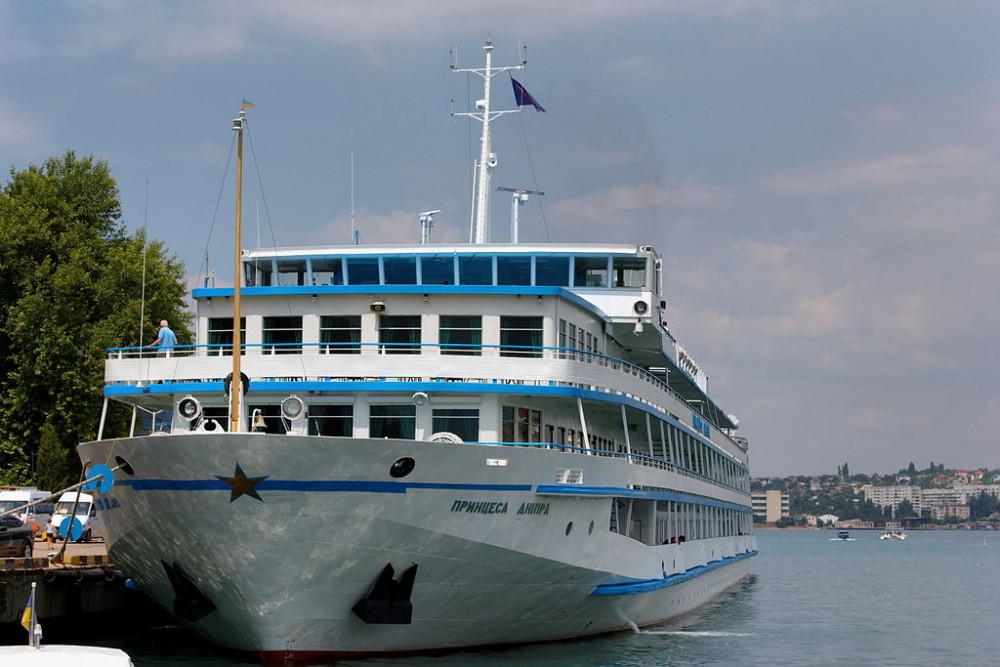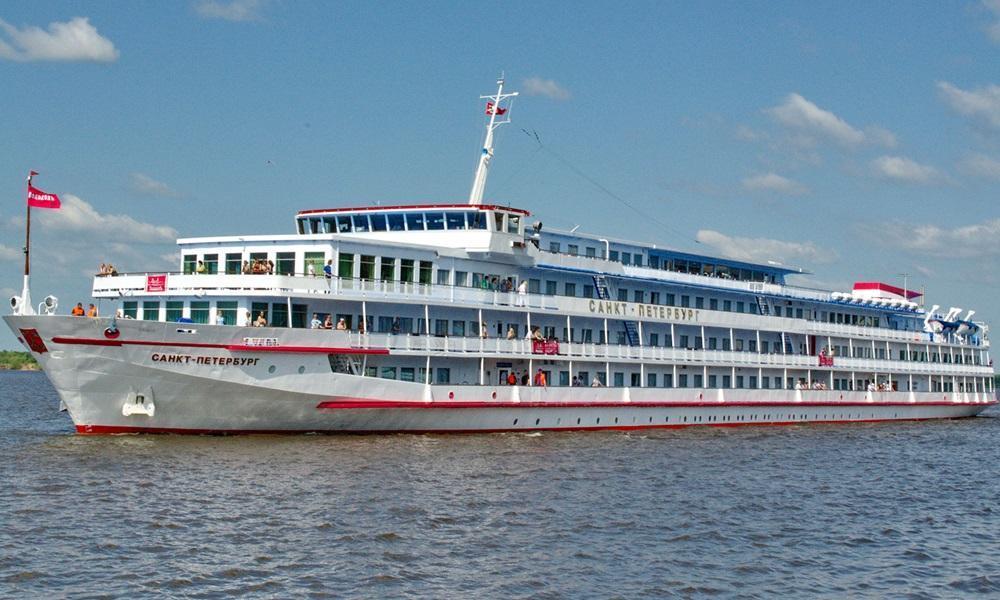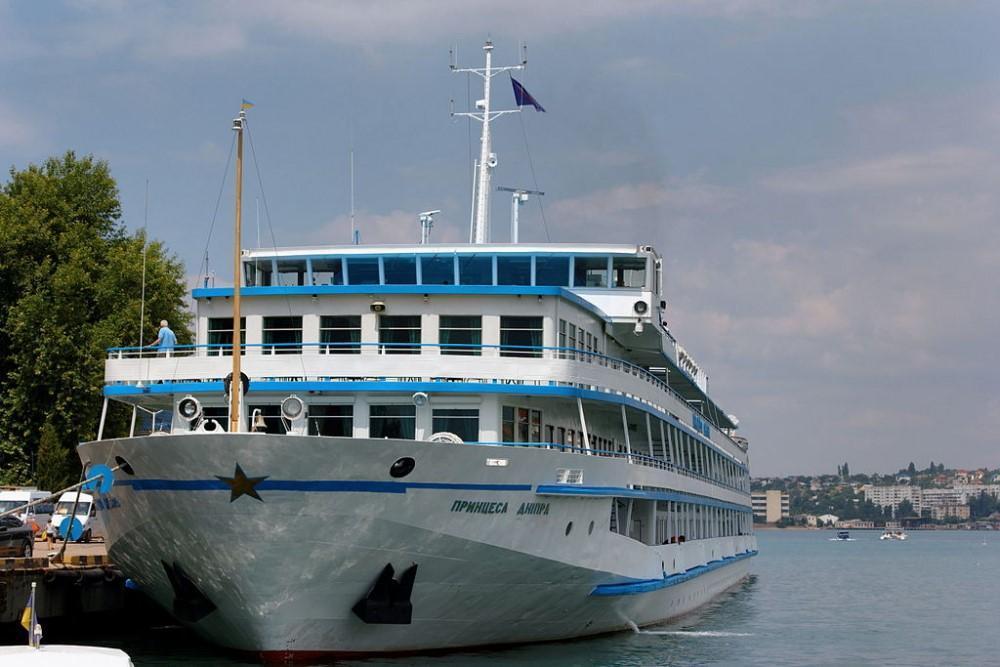MS Dnieper Princess
Former name: Yevgeniy Vuchetich
MS Dnieper Princess last position
The last location of MS Dnieper Princess is in Black Sea (coordinates 46.55668 N / 32.27395 E) cruising at speed of 102.3 kn (189 km/h | 118 mph) The AIS position was last reported 4 years ago.
Current PositionSpecifications of MS Dnieper Princess
| Year of build | 1967 / Age: 58 |
| Flag state | Ukraine |
| Builder | RSW Rosslauer Schiffswerft GmbH (Dessau-Rosslau, Germany) |
| Class | USSR Russian cruise ship (Project 301) |
| Ferry route / homeports | Kiev-Odessa |
| Speed | 14 kn / 26 km/h / 16 mph |
| Length (LOA) | 125 m / 410 ft |
| Beam (width) | 17 m / 56 ft |
| Gross Tonnage | 5400 gt |
| Passengers | 320 |
| Crew | 98 |
| Decks | 5 |
| Cabins | 150 |
| Decks with cabins | 4 |
| Last Refurbishment | 2008 |
| Sister-ships | Vladimir Ilyich-class |
| Former names | Yevgeniy Vuchetich |
| Operator | Imperial River Cruises |
MS Dnieper Princess Review
Review of MS Dnieper Princess
MS Dnieper Princess cruise ship ("Printsesa Dnipra" круизный корабль) is a traditional Russian river passenger vessel built for the USSR (Soviet Union) in the GDR (Eastern Germany). She operates on the Dnieper River (Ukraine) on 13-day roundtrip itineraries from Kiev to Odessa (Black Sea), as well as 12-day cruises between Ukraine and Romania (Kiev–Odessa–Fetesti and the reverse). The ship is currently operated by the Russian company "Imperial River Cruises" and the Ukrainian company "Chernova Ruta".

The ship’s interior is designed in a classic style, with great attention given to the arrangement of the dining areas, which are cozy and spacious. The décor and design of the public spaces create a welcoming atmosphere that encourages guests to relax, socialize, and enjoy their time onboard.
Dnieper Princess accommodates up to 320 passengers. Cabins are compact (average size 10 m² / 110 ft²) but functional, featuring large picture windows that open (except on the Lower Deck, where cabins have portholes). Amenities include two Pullman-style berths, radio, air conditioning, and private bathrooms with a sink and shower.
The ship has two restaurants, both offering meals in a single seating. Two cozy bars and a concert hall are located on the Sun Deck. Dining options include Ukrainian and international cuisine. The crew is young and friendly. Although not matching the standards of Western-style ships, Dnieper Princess provides an excellent and authentic way to explore this fascinating region. The vessel is non-smoking throughout, except in designated outdoor areas.
Itineraries
MS Dnieper Princess operates a 12-day "Black Sea and Dnieper" cruisetour, roundtrip from Kyiv. For international travelers, fares start from USD 1,700 per person (EUR 1,400 / GBP 1,270), including international flights to and from Ukraine.
| Date / Time | Port |
|---|---|
| 14 May | Flight |
| 14 May - 16 May 18:00 | Departing from Kiev, Ukraine |
| 18 May 08:00 - 15:00 | Zaporizhia (Zaporozhye), Ukraine |
| 19 May 08:00 - 13:00 | Kherson, Ukraine |
| 19 May 22:00 - 22 May 16:00 | Odessa, Ukraine |
| 24 May 15:00 - 20:00 | Kremenchuk, Ukraine |
| 25 May 08:00 - 12:00 | Kaniv, Ukraine |
| 25 May 21:00 | Arriving in Kiev, Ukraine |
| 26 May | Flight |
Note: You can view CruiseMapper’s full list of river cruise ships and riverboats in the “Itinerary” section of our River Cruises hub. All companies and their fleets are listed there.
MS Dnieper Princess Wiki
Built as "Yevgeniy Vuchetich," MS Dnieper Princess is one of Russia's signature "Project 301" river cruise ships.
Vladimir Ilyich-class Russian river ships
The "Vladimir Ilyich class" (also known as "Project 301") consists of three series of Russian river cruise ships built in the GDR (Germany) for the USSR (Soviet Union) between 1974 and 1983. The class name honors Vladimir Ilyich Ulyanov (1870–1924), considered the founder of the Soviet Union.
All 22 vessels in this class were built by VEB Elbewerft Boizenburg and became some of the most successful riverboat designs in the industry. These ships operated passenger cruises in northwestern parts of the USSR—on the Volga, Belomorkanal, Lake Onega, Volga–Don Canal, Kama, and Amur rivers, as well as the Dnieper River (Ukraine) and the Black Sea. After the USSR’s collapse in 1991, the vessels were acquired by private companies, both Russian and foreign.

"Project 301" ship technology
All "Project 301" ships share the following characteristics:
- LOA: 125 m (410 ft)
- Beam: 17 m (55 ft)
- DWT: 3063 tons
- V-shaped hulls (differing by series in exterior details, window shape—rectangular or rounded—and wheelhouse lights)
- Five decks
- Passenger capacity: 240; crew: 110; 102 outside cabins; two restaurants; two bar lounges; sauna; souvenir shop; lobby with reception and safe; and a 360-degree promenade deck with outdoor seating
- Powered by three 4-stroke marine diesel engines ("Viertakt-Dieselmotor," model 6ЧРН 36/45 / ЭГ70-5), each with a turbocharger
- The third (final) series features stronger propulsion with bow thrusters
- Cabins include single and double (originally 1-, 2-, or 3-bed), all with private bathrooms
- After reconstruction, many ships were refitted with larger cabins, including suites
Depending on the series, vessels differ in size and equipment, particularly in engine design. Many were fully refurbished and rebuilt for foreign river cruise operators such as Viking, AmaWaterways, and Grand Circle. During their multi-million-dollar drydock refits, passenger capacity was significantly reduced to enhance comfort and safety.
Project 301 ships
The first series of Project 301 includes:
- Vladimir Ilyich (1975, now Sankt Peterburg / Санкт-Петербург)
- Mariya Ulyanova (1975, now Viking Rurik)
- Yevgeniy Vuchetich (1976, now Dnieper Princess)
- Sovetskaya Ukraina (1976, now Konstantin Korotkov)
- Tikhiy Don (1977, Тихий Дон)
- XXV Syezd KPSS (1977, now Petr Chaykovskiy)
The second series includes:
- Sovetskaya Rossiya (1977, now Nizhny Novgorod / Нижний Новгород)
- 60 let Oktyabrya (1978, scrapped as Avicena)
- Rossiya (1978, Россия)
- Vladimir Mayakovskiy (1978, Владимир Маяковский)
- Lenin (1979, now Mikhail Bulgakov / Михаил Булгаков)
- Aleksandr Ulyanov (1979, now Kronstadt / Кронштадт)
- Mikhail Lomonosov (1979, now Viking Sineus)
- Konstantin Fedin (1980, Константин Федин)
- 30 let GDR (1980, scrapped as Ferris Flotel)
- Vissarion Belinsky (1980, Виссарион Белинский)
The third (final) series includes:
- Sovetskaya Konstitutsiya (1981, now Nikolay Karamzin / Николай Карамзин)
- Nikolay Chernyshevsky (1981, Николай Чернышевский)
- Nikolay Dobrolyubov (1981, now Andrey Rublev / Андрей Рублев)
- Aleksandr Radishchev (1982, Александр Радищев)
- Aleksandr Griboyedov (1982, now Knyazhna Viktoria / Княжна Виктория)
- Fedor Dostoevskiy (1983, Федор Достоевский)
